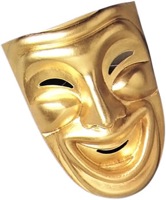Comedy
Origin
Middle English, from Medieval Latin comoedia, from Latin, drama with a happy ending, from Greek kōmōidia, from kōmos revel + aeidein to sing
The word "comedy" is derived from the Classical Greek κωμῳδία kōmōidía, which is a compound either of κῶμος kômos (revel) or κώμη kṓmē (village) and ᾠδή ōidḗ (singing); it is possible that κῶμος itself is derived from κώμη, and originally meant a village revel. The adjective "comic" (Greek κωμικός kōmikós), which strictly means that which relates to comedy is, in modern usage, generally confined to the sense of "laughter-provoking". Of this, the word came into modern usage through the Latin comoedia and Italian commedia and has, over time, passed through various shades of meaning.
Definitions
- b : a literary work written in a comic style or treating a comic theme
- 2a : a drama of light and amusing character and typically with a happy ending
- b : the genre of dramatic literature dealing with the comic or with the serious in a light or satirical manner — compare tragedy
- 3: a ludicrous or farcical event or series of events <a comedy of errors>
- 4a : the comic element <the comedy of many life situations>
- b : humorous entertainment <nightclub comedy>
Description
Comedy (from the Greek: κωμῳδία, kōmōidía), in the contemporary meaning of the term, is any discourse or work generally intended to be humorous or to amuse by inducing laughter, especially in theatre, television, film and stand-up comedy. This sense of the term must be carefully distinguished from its academic one, namely the comic theatre, whose Western origins are found in Ancient Greece. In the Athenian democracy, the public opinion of voters was influenced by the political satire performed by the comic poets at the theaters. The theatrical genre can be simply described as a dramatic performance which pits two societies against each other in an amusing agon or conflict. Northrop Frye famously depicted these two opposing sides as a "Society of Youth" and a "Society of the Old", but this dichotomy is seldom described as an entirely satisfactory explanation. A later view characterizes the essential agon of comedy as a struggle between a relatively powerless youth and the societal conventions that pose obstacles to his hopes. In this struggle, the youth is understood to be constrained by his lack of social authority, and is left with little choice but to take recourse in ruses which engender very dramatic irony which provokes laughter.
Satire and political satire use ironic comedy to portray persons or social institutions as ridiculous or corrupt, thus alienating their audience from the object of humor. Satire is a type of comedy. Parody subverts popular genres and forms, using certain ironic changes to critique those forms from within (though not necessarily in a condemning way). Screwball comedy derives its humor largely from bizarre, surprising (and improbable) situations or characters. Black comedy is defined by dark humor that makes light of so-called dark or evil elements in human nature. Similarly scatological humor, sexual humor, and race humor create comedy by violating social conventions or taboos in comic ways. A comedy of manners typically takes as its subject a particular part of society (usually upper class society) and uses humor to parody or satirize the behavior and mannerisms of its members. Romantic comedy is a popular genre that depicts burgeoning romance in humorous terms and focuses on the foibles of those who are falling in love.[1]
